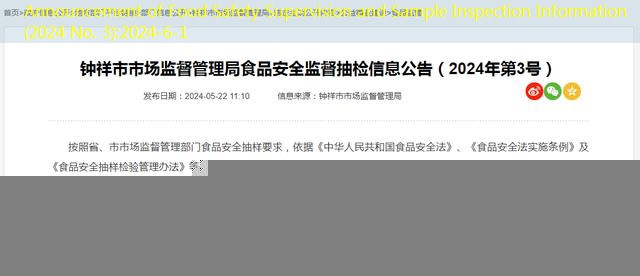Xinhua News Agency, Beijing, April 24th.
Food Safety Law of the People’s Republic of China
(The Seventh Meeting of the Standing Committee of the Eleventh National People’s Congress of the National People’s Congress on February 28, 2009 adopted April 24, 2015
The 14th meeting of the Standing Committee of the Twelfth National People’s Congress was revised)
Table of contents
Chapter 1 General Principles
Chapter 2 Food Safety Risk Monitoring and Evaluation
Chapter III Food Safety Standards
Chapter 4 Food Production and Management
Section 1 generally stipulates
Section 2 production and operation process control
Section 3 label, instructions and advertisements
Section 4 Special Food
Chapter 5 Food Inspection
Chapter 6 Food Import and Export
Chapter VII Food Safety Accident Response
Chapter 8 Supervision and Management
Chapter 9 Legal Responsibility
Chapter 10 Attachment
Chapter 1 General Principles
Article 1 In order to ensure food safety, ensure the health and life safety of the public, this law is formulated.
Article 2 Equipping the following activities in the People’s Republic of China shall comply with this law:
(1) Food production and processing (hereinafter referred to as food production), food sales and catering services (hereinafter referred to as food management);
(2) Production and operation of food additives;
(3) The production and operation of food production and operations for food packaging materials, containers, detergents, disinfectants, and tools and equipment for food production and operation (hereinafter referred to as food -related products);
(4) Food producers and operators use food additives and food -related products;
(5) Storage and transportation of food;
(6) Safety management of food, food additives, food -related products.
The quality and safety management of primary products (hereinafter referred to as edible agricultural products), which is consumed by agriculture, complies with the provisions of the “Agricultural Product Quality and Safety Law of the People’s Republic of China”.However, if the market sales of edible agricultural products, the formulation of quality and safety standards, the announcement of safety information, and the announcement of the security information, and the law of this law, the agricultural investment items shall comply with the provisions of this law.
Article 3 Food safety work implements prevention -oriented, risk management, full control, and social co -governance, and establish a scientific, strict supervision and management system.
Article 4 The safety of food production and operators is responsible for its production and operation food.
Food production and operators shall engage in production and operation activities in accordance with laws, regulations and food safety standards to ensure food safety, integrity and self -discipline, responsible for society and the public, accept social supervision, and assume social responsibility.
Article 5 The State Council establishes a food safety committee, and its duties shall be stipulated by the State Council.
In accordance with the responsibilities stipulated by the Law and the State Council’s duties, the State Council’s Food and Drug Supervision and Administration departments shall be supervised and managed on food production and operation activities.
In accordance with the responsibilities stipulated by the Law and the State Council, the State Council organized the monitoring of food safety risk monitoring and risk assessment, and formulated and announced national standards for food safety.
Other relevant departments of the State Council take the responsibilities stipulated in this law and the State Council, and assume relevant food safety work.
Article 6 The local people’s governments at or above the county level are responsible for the food safety supervision and management of their administrative areas.Management work mechanism and information sharing mechanism.
Local people’s governments at or above the county level determine the duties of food and drug supervision and management, health administrative departments and other relevant departments at this level in accordance with the regulations of this law and the State Council.Relevant departments are responsible for food safety supervision and management in their own administrative areas within their respective responsibilities.
The food and drug supervision and management department of the county -level people’s government may set up dispatch agencies in towns or specific areas.
Article 7 The local people’s governments at or above the county level shall implement the food safety supervision and management responsibility system.The higher -level people’s government is responsible for evaluating and evaluating the food safety supervision and management of the next -level people’s government.Local people’s governments at or above the county level are responsible for evaluating and evaluating the food safety supervision and management of food and drug supervision and management departments and other relevant departments at the county level.
Article 8 The people’s governments at or above the county level shall incorporate food safety work into the national economic and social development plan at the level, include food safety work funds in the financial budget at the government, strengthen the construction of food safety supervision and management capabilities, and provide guarantee for food safety work.Essence
The food and drug supervision and management departments and other relevant departments of the people’s governments at or above the county level shall strengthen communication and close cooperation, divide their responsibilities in accordance with their respective responsibilities, exercise their powers in accordance with the law, and bear responsibility.
Article 9 The Food Industry Association shall strengthen industry self -discipline, establish and improve industry specifications and rewards and punishment mechanisms in accordance with the charter, provide food safety information, technology and other services, guide and urge food production and operators to produce and operate in accordance with the law, promote industry integrity construction, publicize, and popularize foodsafety knowledge.
Consumer Associations and other consumer organizations conduct social supervision on violation of the provisions of this Law and harming the legitimate rights and interests of consumers.
Article 10 The people’s governments at all levels shall strengthen the publicity and education of food safety, popularize the knowledge of food safety, and encourage social organizations, grass -roots mass autonomous organizations, food production and operators to carry out food safety laws, regulations, and food safety standards and knowledge.Promote a healthy diet and enhance consumer food safety awareness and self -protection ability.
The news media shall carry out public welfare publicity of food safety laws, regulations, and food safety standards and knowledge, and supervise public opinion illegal behavior of food safety.Propaganda and reports on food safety should be true and fair.
Article 11 The state encourages and supports basic research and application research related to food safety, and encourages and supports food production and operators to adopt advanced technology and advanced management specifications to improve the level of food safety.
The country’s use of pesticides has implemented a strict management system, accelerated the elimination of toxic, high toxic, and high residue pesticides, promoted the research and development and application of alternative products, and encouraged the use of high -efficiency, low toxic and low residual pesticides.
Article 12 Any organization or individual has the right to report food safety illegal acts, understand food safety information from relevant departments in accordance with the law, and put forward opinions and suggestions on food safety supervision and management.
Article 13 Units and individuals who have made outstanding contributions in food safety work shall be commended and rewarded in accordance with relevant national regulations.
Chapter 2 Food Safety Risk Monitoring and Evaluation
Article 14 The state establishes a food safety risk monitoring system to monitor food -based diseases, food pollution, and harmful factors in food.
The health administrative department of the State Council also formulates and implement the national food safety risk monitoring plan with the State Council’s food and drug supervision and management, quality supervision and other departments.
After the State Council’s food and drug supervision and management departments and other relevant departments, when they learned about food safety risk information, they should immediately verify and report to the health administrative department of the State Council.Regarding the food safety risk information notified by relevant departments and related disease information such as food -based diseases reported by medical institutions, the health administrative department of the State Council shall analyze and study the relevant departments of the State Council.
The health administrative departments of the people’s government of the provincial, autonomous regions, and municipalities directly under the Central Government, together with food and drug supervision and management, quality supervision and other departments of the same level, in accordance with the national food safety risk monitoring plan, combined with the specific situation of their administrative areas, formulate and adjust food safety risk monitoring in their own administrative areasThe plan is reported to the health administrative department of the State Council for the record and implementation.
Article 15 The technical institutions undertaking food safety risk monitoring shall carry out monitoring work in accordance with the food safety risk monitoring plan and monitoring plan to ensure that the monitoring data is true and accurate, and the monitoring data is submitted to the monitoring data in accordance with the requirements of the food safety risk monitoring plan and monitoring plan.And analysis results.
Food safety risk monitoring staff has the right to enter the relevant edible agricultural products planting and breeding, food production and operation places to collect samples and collect relevant data.The collection of samples should be paid at the market price.
Article 16 If the results of food safety risk monitoring shows that there may be hidden dangers of food safety, the health administrative department of the people’s government at or above the county level shall promptly inform the relevant information of food and drug supervision and management at the same level, and report to the people’s government and the people’s government at the higher levelHealth administrative department.Food and drug supervision and management departments shall organize further investigations.
Article 17 The state establishes a food safety risk assessment system, and uses scientific methods to monitor information, scientific data, and relevant information according to food safety risk monitoring information, and the biological, chemical and physical hazards in food, food additives, food -related products, and food -related products.risk assessment.
The health administrative department of the State Council is responsible for organizing food safety risk assessment work, and establishes food safety risk assessment expert committees composed of experts from medical, agriculture, food, nutrition, biology, and environmental experts conduct food safety risk assessment.The results of food safety risk assessment were announced by the State Council’s health administrative department.
For the safety assessment of pesticides, fertilizers, veterinary drugs, feed, and feed additives, experts from the Food Safety Risk Evaluation Expert Committee shall participate.
Food safety risk assessment shall not charge fees from manufacturers, and the collection of samples shall pay according to the market price.
Article 18 If there is one of the following circumstances, the food safety risk assessment shall be conducted:
(1) Monitoring through food safety risk or receiving reports found that food, food additives, and food -related products may have hidden safety hazards;
(2) Provide scientific basis for the formulation or revision of the national standards for food safety to evaluate the risk assessment;
(3) In order to determine the key areas and varieties of supervision and management, the risk assessment is required;
(4) Finding new possible food safety factors;
(5) You need to determine whether a certain factor constitutes a hidden danger of food safety;
(6) The health administrative department of the State Council believes that other situations need to be evaluated by risk assessment.
Article 19 If the State Council Food and Drug Administration, Quality Supervision, Agricultural Administration and other departments have found that food safety risk assessment is required during supervision and management, it shall submit suggestions for the evaluation of food safety risk assessment to the health administrative department of the State Council, and provide a source of risks.Related inspection data and conclusions and other information and information.If it belongs to the situation stipulated in Article 18 of this Law, the health administrative department of the State Council shall conduct a timely assessment of food safety risk and inform the relevant departments of the State Council.
Article 20 The health administration and agricultural administrative departments of the people’s governments at or above the provincial level shall promptly notify the monitoring information of food and edible agricultural product safety risk monitoring information in a timely manner.
The health administration and agricultural administrative department of the State Council shall promptly notify information such as the results of food, edible agricultural product safety risk assessment results.
Article 21 The results of food safety risk assessment are the scientific basis for formulating, revising food safety standards, and implementing food safety supervision and management.
After the evaluation of food safety risk, if food, food additives, and food -related products are not safe, the unsafe conclusions of food -related products shall be announced to the public in accordance with their respective responsibilities, inform consumers to stop eating or use in accordance with their respective responsibilities, and adopt adoptionCorresponding measures to ensure that the food, food additives, and food -related products are stopped in production and operation; if they need to formulate and revise relevant national standards for food safety, the health administrative department of the State Council shall immediately formulate and revise with the Food and Drug Supervision and Administration of the State Council.
Article 22 The food and drug supervision and management departments of the State Council shall, together with relevant departments of the State Council, conduct a comprehensive analysis of food safety status based on the results of food safety risk assessment and food safety supervision and management information.For foods with comprehensive analysis that have a high degree of safety risks, the food and drug supervision and management department of the State Council shall promptly propose a food safety risk warning and announce it to the society.
Article 23 The food and drug supervision and management departments of the people’s government at or above the county level and other relevant departments, the expert committee of the food safety risk assessment and their technical institutions shall organize food production and operators, food, food and operators, food and food in accordance with the principles of science, objective, timely, and disclosure.Inspection agencies, certification agencies, food industry associations, consumer associations, and news media, communicate and communicate with food safety risk assessment information and food safety supervision and management information.
Chapter III Food Safety Standards
Article 24 The formulation of food safety standards shall take the purpose of ensuring the health of the public, and achieve scientific, reasonable, safe and reliable.
Article 25 Food safety standards are the standard for enforcement.Except for food safety standards, other food mandatory standards shall not be formulated.
Article 26 The food safety standards shall include the following content:
(1) Food, food additives, food -related products, pathogenic microorganisms, pesticide residues, veterinary drug residues, biological toxins, heavy metals and other pollution substances, and other limited regulations that harm human health substances;
(2) The variety, scope and dosage of food additives;
(3) The requirements for the nutritional content of the main and auxiliary foods for infants and young children and other specific groups;
(4) The requirements for labels, signs, and manuals related to food safety requirements such as hygiene, nutrition;
(5) Sanitary requirements for the food production and operation process;
(6) Quality requirements related to food safety;
(7) Food inspection methods and regulations related to food safety;
(8) Other content that needs to be formulated as food safety standards.
Article 27 The national standard of food safety shall be formulated and announced by the State Council’s health administrative department in conjunction with the State Council’s Food and Drug Supervision and Administration, and the State Council’s standardized administrative department provides national standard numbers.
The limited regulations of pesticide residues and veterinary drug residues in food and its inspection methods and procedures are formulated by the health administrative department of the State Council and the Agricultural Administration Department of the State Council.
The inspection regulations for slaughtering livestock and poultry are formulated by the Agricultural Administration Department of the State Council and the health administrative department of the State Council.
Article 28 The national standard of food safety shall be formulated in accordance with the results of food safety risk assessment and fully considering the results of the safety risk assessment of edible agricultural products, referring to the results of relevant international standards and international food safety risk assessment results, and the draft food safety national standards to society to societyIt was announced to listen to the opinions of food production and operators, consumers, and relevant departments.
National standards for food safety shall be reviewed and approved by the National Standard Evaluation Committee of the Food Safety Administrative Department organized by the State Council.The National Standard Review Committee of Food Safety, experts in medicine, agriculture, food, nutrition, biology, environment and other aspects, as wellSexual review.
Article 29 If there is no national standard for food safety, the health administrative departments of the people’s government of the province, autonomous region, and municipality may formulate and announce local food safety local standards, and report to the health administrative department of the State Council for the record.After the national standards of food safety are formulated, the local standards will be abolished.
Article 30 The state encourages food manufacturers to formulate corporate standards strict than food safety or local standards, and apply it in the enterprise, and report to the health administrative department of the people’s government of the province, autonomous region, and municipalities directly under the Central Government.
Article 31 The health administrative departments of the people’s government at or above the provincial level shall announce the national standards, local standards, and corporate standards for the formulation and filing of the formulation and filing of the formulation and filing of the formulation and filing of the formulation and filing.
For the implementation of food safety standards, the health administrative department of the people’s government at or above the county level shall give guidance and answers in a timely manner with relevant departments.
Article 32 The health administrative departments of the people’s government at or above the provincial level shall, together with the food and drug supervision, quality supervision, quality supervision, agricultural administrative department and other departments of the same level, they shall follow up and evaluate the implementation of national standards and local standards for food safety, and based on the results of the evaluation results.Revised food safety standards in time.
Food and drug supervision and management, quality supervision, agricultural administration and other departments at the provincial level should collect and summarize the problems existing in the implementation of food safety standards, and inform the health administrative department of the same level in a timely manner.
If food safety standards have problems in the implementation of food safety standards and the food industry associations, they should immediately report to the health administrative department.
Chapter 4 Food Production and Management
Section 1 generally stipulates
Article 33 Food production and operation shall meet food safety standards and meet the following requirements:
(1) Food and raw material treatment and food processing, food processing, packaging, storage and other places that are compatible with food varieties and quantities to maintain the environment of the place is clean, and keep the prescribed distance from the toxic, harmful venues and other pollution sources;
(2) There are production and operation equipment or facilities that are compatible with food varieties and quantities that are compatible with production and operation. There are corresponding disinfection, dressing, washing, lighting, lighting, ventilation, dust -proof, floodproof, mouse -proof, washing, washing, washing, washing, washing, and washingAnd equipment or facilities that handle wastewater, store garbage and waste;
(3) Food and technical personnel, food safety managers and rules and regulations for food safety management personnel, food safety management personnel and food safety personnel;
(4) Have a reasonable equipment layout and process process to prevent the food of food, the cross -contamination of the food, raw materials and finished products, and prevent food contact with poison and unclean objects;
(5) The container of tableware, drinking utensils, and placing directly imported foods should be washed and disinfected before use. After the cooking utensils and utensils are used, they should be washed and kept clean.
(6) The containers, tools and equipment of storage, transportation, and loading and unloading food should be safe and harmless, keep clean, prevent food pollution, and meet special requirements such as the temperature and humidity required for food safety.Storage and transportation together;
(7) Foods directly at the entrance should use non -toxic and clean packaging materials, tableware, drinks and containers;
(8) Food production and operators should maintain personal hygiene. When producing and operating food, they should wash their hands and wear clean work clothes, hats, etc.; When selling direct food without packaging, they should use non -toxic and clean containers, clean containers, and clean containers, clean containers, and clean containers.Sales tools and equipment;
(9) The use of water should meet the health standards of drinking water stipulated in the state;
(10) The detergent and disinfectant used should be safe and harmless to the human body;
(11) Other requirements stipulated in laws and regulations.
If non -food production operators engaged in food storage, transportation, and loading and unloading, they shall comply with the provisions of the sixth paragraph of the previous paragraph.
Article 34 prohibits the production and operation of the following food, food additives, and food -related products:
(1) Foods produced with non -food raw materials or chemicals other than food additives and other foods that may endanger human health materials, or foods produced with recycled foods as raw materials;
(2) Pathotic microorganisms, pesticide residues, veterinary drug residues, biological toxins, heavy metals and other pollutants, as well as other material content that harms human health than food safety standards, food additives, food -related products;
(3) Foods and food additives produced by food raw materials and food additives exceeding the shelf life;
(4) Foods that use food additives in over -range and over -limits;
(5) The nutritional ingredients do not meet the food safety standards for infants and young children and other specific people.
(6) Corruption deterioration, fatty acidity, moldy insects, dirty and unclean, mixed with foreign objects, adulterated or mixed or sensory traits of food and food additives;
(7) Poultry, animals, beasts, aquatic animals and products with sickness, poisoning, or unknown causes;
(8) Failure to conduct quarantine or unqualified meat in accordance with regulations, or unspeakable or unqualified meat products;
(9) Foods and food additives contaminated by packaging materials, containers, transportation tools, etc.
(10) Mark food and food additives that are marked with false production dates, quality periods or exceeding the shelf life;
(11) Pre -packaged food and food additives without labels;
(12) Foods that are prohibited and operated by the state for prevention and other special needs for prevention;
(13) Other foods, food additives, and food -related products that do not comply with laws, regulations or food safety standards.
Article 35 The state implements a permission system for food production and operation.Entering food production, food sales, and catering services shall obtain permission in accordance with the law.However, it is not necessary to obtain a permission to sell edible agricultural products.
Food and drug supervision and management departments at the local people’s government at or above the county level shall review the relevant requirements of Article 33, paragraph 1 to 4 of this Law submitted by the applicant submitted by the “Administrative Licensing Law of the People’s Republic of China”Data, if necessary, conduct on -site inspections of the applicant’s production and operation places; for those who meet the prescribed conditions, permits; for those who do not meet the prescribed conditions, they will not permit and explain the reasons in writing.
Article 36 Entering food production and operation activities such as small food production and processing workshops and food vendors shall meet the food safety requirements that are compatible with their production and operation scale and conditions, and ensure the food hygiene, non -toxic, non -toxic, non -toxic, non -toxic, non -toxic, non -toxic, non -toxic, non -toxic, non -toxic, toxicity,Harmic, the food and drug supervision and management department shall strengthen supervision and management.
The local people’s governments at or above the county level shall comprehensively govern the food production and processing small workshops, food vendors, etc., strengthen services and unified planning, improve their production and operation environment, encourage and support their improvement of production and operation conditions, enter the centralized trading market, stores and other fixed fixed fixedOperation of the place, or in the designated temporary operation area and time period.
Specific management methods for food production and processing small workshops and food vendors are formulated by provinces, autonomous regions, and municipalities.
Article 37 The use of new food raw materials to produce foods, or to produce new varieties of food additives and new varieties of food -related products, shall submit safety evaluation materials for related products to the health administrative department of the State Council.The health administrative department of the State Council shall organize review within 60 days from the date of receipt of the application; those who meet food safety requirements shall be permitted and announced; those who do not meet food safety requirements shall not permit and explain the reasons in writing.
Article 38 Drugs shall not be added to foods for production and operation, but they can add substances that are both foods and Chinese medicinal materials according to tradition.According to tradition, the material directory of food and Chinese medicinal materials is formulated and announced by the health administrative department of the State Council and the State Council’s Food and Drug Supervision and Administration.
Article 39 The state’s permission system for food additive production is implemented.Entering food additive production, there should be places, production equipment or facilities, professional and technical personnel and management systems that are compatible with the variety of food additives produced, and obtain food additive production in accordance with the procedures stipulated in Article 35 of this Law.license.
The production of food additives shall comply with national standards for laws, regulations and food safety.
Article 40 The food additives shall be technically necessary and proves that the risk assessment is safe and reliable before it can be included in the allowable use scope; national standards for food safety shall be revised in time according to technical necessity and food safety risk assessment results.
Food producers and operators should use food additives in accordance with national standards for food safety.
Article 41 The production of food -related products shall comply with national standards for laws, regulations and food safety.For food -related products with high risks such as packaging materials directly contacting foods, production permits are implemented in accordance with the provisions of national industrial product production license management.The quality supervision department shall strengthen the supervision and management of food -related product production activities.
Article 42 The state’s establishment of food safety tracing system.
Food production and operators shall establish a food safety traceability system in accordance with the requirements of this law to ensure that food traceability can be traced.The state encourages food production and operators to adopt information -based collection, retain production and operation information, and establish a food safety traceability system.
The Food and Drug Administration of the State Council, together with relevant departments such as the State Council’s agricultural administration, etc., to establish a food safety traceability cooperation mechanism.
Article 43 Local people’s governments at all levels shall take measures to encourage food large -scale production and chain operations and distribution.
The state encourages food production and operation enterprises to participate in food safety liability insurance.
Section 2 production and operation process control
Article 44 Food production and operation enterprises shall establish and improve the food safety management system, conduct food safety knowledge training for employees, strengthen food inspection work, and engage in production and operation activities in accordance with the law.
The main person in charge of food production and operation enterprises shall implement the food safety management system of the enterprise and be fully responsible for the company’s food safety work.
Food production and operation enterprises should be equipped with food safety management personnel to strengthen their training and assessment.Those who do not have food safety management capabilities after assessment shall not go to work.The food and drug supervision and management department shall randomly supervise the random inspection and assessment of the food safety management personnel of the enterprise and announce the assessment.Supervision and random inspections shall not charge fees.
Article 45 Food production and operators shall establish and implement the health management system of employees.Persons with the stipulated in the health administrative department of the State Council shall not engage in the work of direct contact with direct import food.
Food production and operators engaged in direct food work should conduct health inspections every year to obtain health certificates before they can work.
Article 46 Food manufacturers shall formulate and implement control requirements for the following matters to ensure that the food produced meets food safety standards:
(1) Control of raw material procurement, raw materials acceptance, and investment;
(2) Production process, equipment, storage, packaging and other key link control;
(3) Inspection and control of raw materials inspection, semi -finished product inspection, and inspection of finished products;
(4) Transportation and delivery control.
Article 47 Food production and operators shall establish a food safety self -inspection system and regularly check and evaluate food safety status.If the production and operation conditions change and no longer meet the requirements of food safety, food production and operators shall immediately take rectification measures; if there is a potential risk of food safety accidents, food production and operation activities should be stopped immediately, and the food and drugs of the people’s government in the county level are located.Supervision and management department report.
Article 48 The state encourages food production and operation enterprises to meet the requirements of good production specifications, implement the system of hazardous analysis and key control points, and improve the level of food safety management.
For food production and operation enterprises that have passed good production specifications, analysis of hazards, and key control points systems, the certification institutions shall implement tracking surveys in accordance with the law; for enterprises that no longer meet the certification requirements, they shall withdraw certifications in accordance with the law, and timely to the people’s governments at or above the county level of the people’s governments at or above the county levelThe drug supervision and management department notified and announced to the society.The certification agency shall not charge a follow -up investigation.
Article 49 The edible agricultural product producers shall use agricultural investment products such as pesticides, fertilizers, veterinary drugs, feed and feed additives in accordance with the food safety standards and relevant national regulations, and strictly implement the provisions of the safety interval between agricultural input products.A state -prohibited agricultural investment is not allowed to be used.It is forbidden to use highly toxic, highly toxic pesticides for crops prescribed by countries such as vegetables, fruits, tea, and Chinese herbal medicines.
Economic Organization for Economic Organization for Farmers’ Professional Cooperation of Agricultural Products shall establish a record system for the use of agricultural input products.
The agricultural administrative departments of the people’s government at or above the county level shall strengthen the supervision and management and guidance of the use of agricultural input products, and establish and improve the system of safe use of agricultural input products.
Article 50 Food producers to purchase food raw materials, food additives, and food -related products shall check the license and product qualification certificate of the supplier; for food raw materials that cannot provide qualified certificates, they shall be inspected in accordance with food safety standards;Or use food ingredients, food additives, and food -related products that do not meet food safety standards.
Food manufacturers should establish a checking record system for food raw materials, food additives, food -related product purchase inspection, and truthfully record food raw materials, food additives, food -related products, specifications, quantity, production date or production batch number, shelf life, purchase date, supply date, supply date, supply date, supply date, supply date, supply date, supply date, supply date, supply date, supply date, supply date, supplyThe name, address, contact information, etc., and save relevant vouchers.Records and vouchers shall not be less than six months after the product shelf life expires; if there is no clear preservation period, the preservation period shall not be less than two years.
Article 51 Food manufacturers shall establish a food factory inspection and record system, check out the inspection certificate and safety status of the factory food, and truthfully record the name, specifications, quantity, production date or production batch number, quality of inspection, inspection certificate number, qualification certificate number, inspection certificate number, inspection qualification certificate numberThe sales date and the name of the buyer, address, contact information, etc., and save relevant vouchers.Records and vouchers shall comply with the provisions of Article 50, paragraph 2 of this law.
Article 52 The producers of food, food additives, and food -related products shall check the food, food additives, and food -related products produced in accordance with food safety standards. After passing the inspection, the factory or sales can be sold.
Article 53 If food operators purchase food, they shall check the licenses of suppliers and qualified certificates of food export inspection or other qualification certificates (hereinafter referred to as qualified certification documents).
Food business enterprises should establish a food purchase inspection record system, and truthfully record the name, specifications, quantity, production date or production batch number, shelf life, purchase date, and supplier name, address, contact information, etc., and save relevant vouchers.Records and vouchers shall comply with the provisions of Article 50, paragraph 2 of this law.
Food business enterprises with unified distribution operation methods can uniformly check the license and food qualification document documents of the supplier’s headquarters and conduct food purchase inspection records.
Business enterprises engaged in food wholesale business shall establish a food sales record system, and truthfully record the name, specifications, quantity, production date or production batch number, shelf life, sales date, address, address, contact information, etc. of the wholesale food, and save the name, address, contact information, etc.Related vouchers.Records and vouchers shall comply with the provisions of Article 50, paragraph 2 of this law.
Article 54 Food operators shall store food in accordance with the requirements of ensuring food safety, check inventory food regularly, and timely clean up foods that have metastasized or exceed the shelf life.
Food operators store bulk foods, which should indicate the name of the food, production date or production batch number, shelf life, producer name and contact information at the storage location.
Article 55 The catering service provider shall formulate and implement the control requirements of raw materials, and shall not purchase food raw materials that do not meet food safety standards.Promote the public processing process of catering service providers, publicize food raw materials and its source information.
During the processing process, the catering service provider should check the food and raw materials to be processed during the processing process. If it is found that the situation specified in Article 34 of the Law, it shall not be processed or used.
Article 56 The catering service provider shall regularly maintain facilities and equipment such as food processing, storage, and display; regular cleaning, checking thermal insulation facilities and refrigerating and freezing facilities.
Catering service providers should clean and disinfect the tableware and beverages in accordance with the requirements, and shall not use uninterrupted disinfection tableware and drinking utensils; if the catering service provider entrusts the disinfection of disinfection tableware and drinks, it shall commission the tableware that meets the conditions stipulated in this LawConcentrated disinfection service unit.
Article 57. The cafeterias of concentrated dining units such as schools, childcare institutions, pension institutions, and construction sites shall strictly abide by laws, regulations and food safety standards; if they order meals from the dining unit, they shall order enterprises that obtain food production and operation permits.And check the order ordered food in accordance with the requirements.The food supply unit shall strictly abide by laws, regulations and food safety standards to ensure food safety when meals.
The competent authorities of schools, childcare institutions, pension institutions, construction sites and other concentrated dining units shall strengthen food safety education and daily management of centralized dining units, reduce food safety risks, and timely eliminate hidden food safety hazards.
Article 58 The centralized disinfection service units of tableware and drinking utensils shall have the corresponding operating venue, cleaning and disinfection equipment or facilities, and detergents and disinfection agents used in water and use shall meet national standards of relevant food safety, and other national standards and health specifications.
The centralized disinfection service units of tableware and drinking utensils shall conduct batch inspections on disinfection tableware and beverages, and the factory can be issued after passing the inspection.Disinfected tableware and drinks should be marked with the name, address, contact information, disinfection date, and use period on independent packaging.
Article 59 The producer of food additives shall establish a food additive to export the factory inspection record system, check out the inspection certificate and safety status of the factory product, and truthfully record the name, specifications, quantity, production date or production batch number, quality shelf life, inspection period, inspection qualification, qualifications of the food additivesCertificate numbers, sales date, and purchasers name, address, contact information and other related content, and save relevant vouchers.Records and vouchers shall comply with the provisions of Article 50, paragraph 2 of this law.
Article 60 Food additive operators to purchase food additives shall check the license and product qualification certification documents of the supplier according to law, and truthfully record the name, specifications, quantity, production date or production batch number, shelf life, delivery date, supply date, supply date, and supply of food additives.The name of the cargo, address, contact information, etc., and save relevant vouchers.Records and vouchers shall comply with the provisions of Article 50, paragraph 2 of this law.
Article 61 The organizers, counters, and exhibition organizers of the concentrated trading market shall review the permits of the food operators admitted in accordance with the law, clarify their food safety management responsibilities, and check their operating environment and conditions on a regular basis.If it is discovered that it violates the provisions of this Law, it shall be stopped and immediately reports to the food and drug supervision and management department of the county -level people’s government.
Article 62 The provider of third -party platforms for online food transactions shall register real -name for the food operators of the network to clarify their food safety management responsibilities; if they shall obtain a license in accordance with the law, their licenses shall also be reviewed.
If the provider of the third -party platform of online food trading discovered that the food operator of the network is violating the acts stipulated in this Law, it shall stop and immediately report the food and drug supervision and management department of the county -level people’s government at the local people’s government;Platform service.
Article 63 The state’s establishment of a food recall system.Food producers found that the food produced does not meet the food safety standards or has evidence to prove that it may endanger human health, and they should stop production immediately, recall the food that has been listed on sale, notify relevant production operators and consumers, and record the recall and notification situation.Essence
Food operators find that the food it operates has a stipulated situation in the previous paragraph, shall immediately stop the operation, notify relevant production operators and consumers, and record the stop operation and notification.Food producers believe that they should be recalled and they should be recalled immediately.If the food operators have the stipulated situation in the preceding paragraph due to food operators, food operators should be recalled.
Food manufacturers should take measures such as harmless treatment and destruction of the recalled food to prevent them from flowing into the market again.However, food producers can continue to be sold because of the recalled food, sign or instructions that do not meet the food safety standards, and food producers can continue to be sold when they take remedial measures and ensure food safety; they should show remedial measures to consumers when selling.
Food producers and operators shall report food recall and treatment to the food and drug supervision and management department of the county -level people’s government at the local people’s government; if they need to be harmless and destroyed by the recalled food, the time and place should be reported in advance.The food and drug supervision department believes that if necessary, on -site supervision can be implemented.
If food manufacturers fail to recall or stop operations in accordance with the provisions of this article, the food and drug supervision and management department of the people’s government at or above the county level may order it to recall or stop operation.
Article 64 The edible agricultural product wholesale market shall be equipped with inspection equipment and inspectors or entrustment of food inspection agencies that meet the stipulated in this Law to sample inspection of edible agricultural products sold in the wholesale market; if they find that they do not meet food safety standards, they shall require requestThe seller immediately stopped selling and reported to the food and drug supervision and management department.
Article 65 The sellers of edible agricultural products shall establish a check -up record system for the purchase of edible agricultural products, and truthfully record the name, quantity, purchase date, and supplier name, address, contact information, etc. of the edible agricultural products, and save relevant vouchers.Records and vouchers shall not be less than six months.
Article 66. Edible agricultural products that enter the market will be used in packaging, fresh -keeping, storage, and transportation of food additives such as fresh -keeping agents, preservatives and other foods, and packaging materials such as food safety.
Section 3 label, instructions and advertisements
Article 67 The packaging of pre -packaged food shall be labeled.The label should be indicated by the following matters:
(1) Name, specifications, net content, production date;
(2) Ingredients or ingredients;
(3) The name, address, and contact information of the producer;
(4) The shelf life;
(5) Product standard code;
(6) Storage conditions;
(7) The common name of food additives used in national standards;
(8) Production license number;
(9) Other matters indicated by laws, regulations or food safety standards.
The labels for infants and young children and other specific groups should also indicate the main nutritional ingredients and their content.
If the national standards of food safety have other regulations on labeling, it is stipulated.
Article 68 Food operators sell bulk foods and shall indicate the name of the food, production date or production batch number, shelf life, and production operator name, address, contact information and other content on the container of bulk food.
Article 69 The production and operation of genetically modified food shall be significantly marked in accordance with regulations.
Article 70 Food additives shall have labels, manuals and packaging.The labels and instructions should be stated that the matters stipulated in Article 67, paragraph 1, paragraph 1, paragraph 1 of this Law, and the scope, dosage, and usage methods of food additives, and in the label, andUpload the words “food additives”.
Article 71 The labels and manuals of food and food additives shall not contain false content, and shall not involve disease prevention and treatment functions.Production operators are responsible for the label and manual it provided.
The labels and manuals of food and food additives should be clear and obvious. Matters such as production date and shelf life should be significantly marked and easy to identify.
Food and food additives do not match the contents of their labels and manuals, shall not be listed and sold.
Article 72 Food operators shall sell foods in accordance with the warning signs, warning descriptions or precautions marked by the food label.
Article 73 The content of food advertising shall be true and legal, and shall not contain false content, and shall not involve disease prevention and treatment functions.Food manufacturers are responsible for the authenticity and legitimacy of food advertising content.
The food and drug supervision and management departments of the people’s governments at or above the county level and other relevant departments, as well as food inspection agencies and food industry associations shall not recommend food to consumers in advertising or other forms.Consumer organizations must not charge consumers to recommend foods to consumers by collecting fees or other benefits.
Section 4 Special Food
Article 74 The state shall implement strict supervision and management of special foods such as health food, special medical use formula food and infant formula food.
Article 75 The health food claims that the health care function shall have a scientific basis, and shall not have acute, subacute or chronic harm to the human body.
The health food catalog and the health care function catalog that allows health foods is formulated, adjusted and announced by the State Council’s food and drug supervision and management department in conjunction with the health administrative department of the State Council and the national traditional Chinese medicine management department.
The health food raw material directory shall include the name of the raw material, the amount and the corresponding effects of the raw material; the raw materials included in the health food raw material catalog can only be used for health food production and cannot be used for other food production.
Article 76 The health foods and the first imported health food that uses the raw materials outside the health food raw materials shall be registered with the food and drug supervision and management department of the State Council.However, if the first -time imported health food belongs to nutrients such as vitamins, minerals, etc., it shall be reported to the food and drug supervision and management department of the State Council for the record.Other health foods shall be reported to the food and drug supervision and management departments of the people’s governments of the province, autonomous region, and municipality directly under the Central Government.
Imported health foods should be products that the competent departments of exporters (regions) are allowed to be listed and sold.
Article 77 The health food that shall register in accordance with the law shall submit the research and development reports, product formulas, production technology, safety and health function evaluation, labels, manuals and other samples of health foods, and provide relevant certification documents.The State Council’s Food and Drug Supervision and Management Department has organized a technical review of the organization and is allowed to register if it meets the requirements of safety and functional claims; if it does not meet the requirements, it will not register and explain the reasons in writing.If the health food that uses the raw materials outside the health food raw material catalog is allowed to register a registered decision, the raw material shall be incorporated into the health food raw material catalog in time.
The health foods that should be filed in accordance with the law shall be submitted to the product formula, production process, labels, manuals, and materials that indicate product safety and health functions when filing.
Article 78 The label and instructions of health foods shall not involve the function of disease prevention and treatment. The content should be true and consistent with the content of registration or filing.Wait, and declare that “this product cannot replace the drug.”The functions and composition of health food should be consistent with labels and manuals.
Article 79 In addition to the provisions of Article 73, paragraph 1, paragraph 1 of this Law, health food advertisements shall also declare that “this product cannot replace the drug”;The food and drug supervision and management department reviews approval and obtains a health food advertising approval document.The food and drug supervision and management departments of the people’s governments of the provincial, autonomous regions, and municipalities shall announce and update the admitted health food advertising catalogs and approved advertising content in a timely manner.
Article 80 Special medical use formula Foods shall be registered by the State Council’s Food and Drug Supervision and Administration Department.When registering, it shall submit materials, production technology, labels, manuals, and materials that indicate the clinical effects of product safety, nutritional adequacy and special medical use.
Special medical use formula food advertisements are applicable to the “Advertising Law of the People’s Republic of China” and other laws and administrative regulations on the management of drug advertising management.
Article 81 The quality control of infant formula food production enterprises shall implement the entire process of entering the factory from raw materials to the finished product factory, and implement batch inspection of infant formula food foods from the factory to ensure food safety.
Fresh milk, auxiliary materials and other food materials, food additives, etc. used by the production of infant formula foods, and food additives shall meet the requirements of laws and administrative regulations and national standards for food safety to ensure the nutritional content required for the growth and development of infants and young children.
Infant formula food manufacturers shall record food raw materials, food additives, product formulas, and labels to the food and drug supervision and management department of the people’s governments of the people’s governments of the province, autonomous region, and municipality directly under the Central Government.
The product formula of infant formula milk powder shall be registered by the State Council’s Food and Drug Supervision and Administration Department.When registering, it shall submit the formula R & D report and other materials that indicate the scientific and safety of the formula.
It is not allowed to produce infant formula milk powder in the form of packaging, and the same company shall not use the same formula to produce different brands of infant formula milk powder.
Article 82 The registrars of health food, special medical use formula food, infant formula milk powder or recorder shall be responsible for the authenticity of the materials submitted.
The food and drug supervision and management departments of the people’s government at or above the provincial level shall promptly announce the health food, special medical use formula food, infant formula milk powder directory, and the company’s secrets learned in the registration or filing.
Health food, special medical use formula food, infant formula milk powder production enterprises shall organize production in accordance with technical requirements such as registered or filing product formulas, production technology and other technical requirements.
Article 83 Enterprises that produce health foods, special medical use formula foods, infant formula foods, and other enterprises that specialize in the main foods dedicated to specific groups shall establish quality management of production quality management that is compatible with the food produced in accordance with the requirements of good production specifications.The system, regular self -examination of the operation of the system to ensure its effective operation and submit a self -examination report to the food and drug supervision and management department of the county -level people’s government at the local people’s government.
Chapter 5 Food Inspection
Article 84 The food inspection agencies obtain the qualification recognition in accordance with the provisions of the national certification and recognition before they can engage in food inspection activities.However, except for the law.
The qualification identification conditions and inspection specifications of the food inspection agency shall be stipulated by the Food and Drug Supervision and Administration Department of the State Council.
The inspection report issued by the food inspection agencies stipulated in this Law has the same effect.
The people’s governments at or above the county level shall integrate food inspection resources to achieve resource sharing.
Article 85 The food inspection is independently performed by the inspector designated by the food inspection agency.
The inspector shall inspect food in accordance with the relevant laws and regulations, and in accordance with the food safety standards and inspection specifications, respect science, abide by professional ethics, and ensure that the inspection data and conclusions issue are objective and fair.
Article 86 The food inspection institution and the responsibility system of the food inspection institution and the inspector.The food inspection report shall be stamped with the official seal of the food inspection agency, and there is a signature or seal of the inspector.Food inspection agencies and inspectors are responsible for the food inspection report issued.
Article 87 The food and drug supervision and management departments of the people’s government at or above the county level shall conduct regular or irregular sampling inspections on food, and announce the inspection results in accordance with relevant regulations, and shall not be exempted from inspection.For sampling inspections, the samples that should be extracted should be purchased, and the food inspection agencies that comply with this Law should be inspected and paid the relevant fees; they must not charge the inspection fee and other expenses from the food production and operators.
Article 88 If there is any objection to the inspection conclusion shall be implemented in accordance with the provisions of this Law, food production and operators may be in the food and drug supervision and management department of the sampling test within seven working days from the date of receiving the inspection conclusion.The food and drug supervision and management department submits an application for re -inspection. The food and drug supervision and management department applied for re -inspection is randomly determined in the list of re -inspection agencies to determine the re -inspection agency for re -inspection.The re -inspection conclusion issued by the re -inspection agency is the final inspection conclusion.The re -inspection agency and the initial inspection agency shall not be the same agency.The list of re -inspection agencies is jointly announced by the State Council’s certification and recognition of supervision and management, food and drug supervision and management, health administration, agricultural administration and other departments.
The use of national regulations to conduct random inspections and detection of edible agricultural products. If the person who is spot -checked has objections to the test results, you can apply for re -examination within four hours from the time of the test results.Re -inspection shall not adopt fast testing methods.
Article 89 Food manufacturers can inspect the foods produced by themselves, or may entrust a food inspection institution that complies with this Law for inspection.
If the food industry associations and consumer associations and other organizations and consumers need to entrust food inspection agencies to inspect food, they shall commission the food inspection institutions that comply with this law.
Article 90 The inspection of food additives shall apply the provisions of the food inspection of this law.
Chapter 6 Food Import and Export
Article 91 The national entry and exit inspection and quarantine department shall supervise and manage the food safety of import and export.
Article 92 Imported food, food additives, and food -related products shall meet the national standards of food safety in my country.
Imported food and food additives shall pass the entry -exit inspection and quarantine agencies in accordance with the provisions of the relevant laws and administrative regulations of the import and export commodity inspection.
Imported food and food additives shall follow the requirements of the national entry -exit inspection and quarantine department in accordance with the request of the national entry and exit inspection and quarantine department.
Article 93 Foods with national standards without food safety are imported by foreign exporters, overseas manufacturers, or importers entrusted to the State Council’s relevant countries (regional) standards or international standards for the implementation of the State Council’s health administrative department.The health administrative department of the State Council reviews the relevant standards and believes that if it meets food safety requirements, it will be temporarily applied and formulate corresponding national standards for food safety in a timely manner.The new varieties of food or imported food additives and new food -related products produced by importing and using new food raw materials shall be handled in accordance with the provisions of Article 37 of this Law.
In accordance with the requirements of the State Council’s health administrative department, the entry and exit inspection and quarantine agencies inspect the food, food additives, and food -related products stipulated in the preceding paragraph.The test results should be made public.
Article 94: Overseas exporters and overseas manufacturers shall ensure that food, food additives, food -related products exported to my country meet the laws of this law and other relevant laws, administrative regulations and national standards for food safety, and label labels The content of the manual is responsible.
Importers shall establish a system for the review system of overseas exporters and overseas manufacturers to focus on reviewing the content specified in the preceding paragraph; those who fail to pass the review shall not be imported.
It is found that imported food does not meet the national standards of food safety in my country or has evidence to prove that it may endanger human health. The importers should immediately stop importing and recall in accordance with the provisions of Article 63 of the Law.
Article 95 Food safety incidents occurred abroad may have an impact on my country, or if severe food safety issues are found in imported food, food additives, and food -related products, the state entry and exit inspection and quarantine department shall timely adopt risk early warning or control The measures were reported to the food and drug supervision and management of the State Council, health administration, and agricultural administrative department.The departments receiving the notification shall take corresponding measures in a timely manner.
The food and drug supervision and management departments of the people’s governments at or above the county level shall supervise and manage the implementation of imported food and food additives sold in the domestic market.If there is a serious food safety problem, the Food and Drug Supervision and Administration Department of the State Council shall promptly inform the state entry and exit inspection and quarantine department.The state immigration inspection and quarantine department shall take corresponding measures in a timely manner.
Article 96 Exporters or agents or importers who export foods exported to my country shall record with the country’s entry and exit inspection and quarantine departments.Overseas food manufacturers exporting foods in my country shall be registered with the national entry -exit inspection and quarantine department.If a registered overseas food manufacturer provides false materials, or if it causes a major food safety accident due to its own reasons, the state entry and exit inspection and quarantine department shall withdraw the registration and announce it.
The national entry and exit inspection and quarantine department shall regularly announce the list of overseas exporters, agents, importers and overseas food manufacturers who have recorded.
Article 97 The imported pre -packaged food and food additives shall have a Chinese label; if there is a manual according to law, there should be a Chinese manual.The label and instructions shall meet the requirements of this law and other relevant laws and administrative regulations in my country and the requirements of national standards for food safety, and stipulate that the origin of food and the name, address, and contact information of domestic agents.If the pre -packaged food does not have Chinese labels, Chinese manuals or labels, and instructions, it shall not be imported.
Article 98 Importers shall establish a system of food and food additive imports and sales records, and truthfully record the names, specifications, quantities, production date, production or import batch number, quality period, overseas exporters and buyers’ names of food and food additives, Address and contact information, delivery date, etc., and save relevant vouchers.Records and vouchers shall comply with the provisions of Article 50, paragraph 2 of this law.
Article 99 Export food manufacturers shall ensure that their export food meets the standards or contract requirements of importing countries (regions).
Export food production enterprises and export food raw materials planting and farms shall be filed with the national entry -exit inspection and quarantine departments.
Article 100 State’s entry and exit inspection and quarantine departments shall collect and summarize the following import and export food safety information, and inform relevant departments, institutions and enterprises in a timely manner:
(1) Entry -exit inspection and quarantine agencies to implement food safety information discovered by import and export food for inspection and quarantine;
(2) Imported food safety information reflected by organizations and consumers such as the Food Industry Association and Consumers Association;
(3) Risk early warning information issued by international organizations, foreign government agencies, and other food safety information, as well as food safety information reflected by organizations and consumers such as overseas food industry associations;
(4) Other food safety information.
The state entry and exit inspection and quarantine department shall implement credit management, establish credit records, establish credit records, and announce them according to law.Importers, exporters and export food manufacturers with bad records should strengthen the inspection and quarantine of their import and export food.
Article 101 The state entry and exit inspection and quarantine department may evaluate and review the food safety management system and food safety status of food safety management to the country (region) exported to my country, and determine the corresponding inspection and quarantine requirements based on the evaluation and review results. Essence
Chapter VII Food Safety Accident Response
Article 102 The State Council organizes the formulation of emergency plans for food safety accidents.
Local people’s governments at or above the county level shall formulate emergency plans for food safety accidents in their own administrative regions in accordance with the provisions of relevant laws and regulations and the actual situation of the food safety accidents and the actual situation of the administrative area.Record.
The emergency plan of food safety accidents shall regulate the grades of food safety accidents, the organizational command system and responsibilities of the accident disposal, prevention and early warning mechanism, disposal procedures, and emergency guarantee measures.
Food production and operation enterprises shall formulate a food safety accident disposal plan, regularly check the implementation of various food safety prevention measures in the enterprise, and eliminate hidden dangers of accidents in a timely manner.
Article 103 The units that occur in food safety accidents shall take measures immediately to prevent the accident from expanding.Incident units and units receiving patients shall promptly report to the food and drug supervision and management of the county -level people’s governments and the health administrative department of the county -level people’s government in a timely manner.
Quality supervision, agricultural administration and other departments at the county level at or above the county level found that food safety accidents or reports to accident reports in daily supervision and management shall immediately report to the food and drug supervision and management department of the same level.
If a food safety accident occurs, the food and drug supervision and management department of the county -level people’s government shall report to the food and drug supervision and management department of the people’s governments at the people and the higher -level people’s government in accordance with the provisions of the emergency plan.The food and drug supervision and management departments of the county -level people’s governments and higher -level people’s governments shall be reported in accordance with the regulations of the emergency plan.
No unit or individual may conceal, report or report the food safety accidents, and may not hide, forge, or destroy relevant evidence.
Article 104 If a medical institution finds that the patients who receive are patients with food -oriented diseases or suspected patients, they shall report the relevant information to the health administrative department of the local people’s government in a timely manner in accordance with regulations.If the health administrative department of the county -level people’s government believes that it is related to food safety, the food and drug supervision and management department of the same level shall be notified in a timely manner.
The health administrative department of the people’s governments at or above the county level found information related to food safety in the investigation and treatment of infectious diseases or other emergencies, and should be reported in a timely manner for food and drug supervision and management departments of the same level.
Article 105 After receiving a report by the food and drug supervision and management department of the people’s government at or above the county level, it shall immediately investigate and deal with the health administration, quality supervision, agricultural administration and other departments at the same level, and take the following measuresOr reduce social harm:
(1) Carry out emergency rescue work and organize the treatment of persons who have caused personal injury due to food safety accidents;
(2) Foods and raw materials that can cause food safety accidents may be performed immediately; and for confirmation of contaminated foods and their raw materials, they are ordered to recall or stop operating in accordance with the provisions of Article 63 of this Law.Items
(3) Sealing contaminated food -related products, and ordering and disinfection;
(4) Do a good job in the release of information, publish food safety accidents and their treatment in accordance with the law, and explain and explain the hazards that may be generated.
If a food safety accident needs to start an emergency plan, the people’s governments at or above the county level shall immediately set up an accident disposal command agency to start emergency plans and deal with the provisions of the previous paragraphs and emergency plans.
In the event of a food safety accident, the prevention and control institutions at or above the county level shall carry out hygienic treatment of the accident site, and conduct an epidemic survey of factors related to the accident. The relevant departments shall assist.Prevention and control institutions at or above the county level shall submit an epidemiological survey report to the supervision and management of food and drugs at the same level, and the health administrative department.
Article 106 If a food safety accident occurs, the food and drug supervision and management departments of the people’s government at or above the municipal level shall immediately conduct an accident responsibility investigation with the relevant departments to urge relevant departments to perform their duties, and to the people’s governments at the same level and the people of the higher -level people levelThe government’s food and drug supervision and management department proposes an accident responsibility investigation and handling report.
The major food safety accidents involving two or more provinces, autonomous regions, and municipalities shall be investigated by the State Council’s food and drug supervision and management departments in accordance with the provisions of the previous paragraphs.
Article 17 to investigate food safety accidents shall adhere to the principles of seeking truth from facts and respecting science, timely and accurately find out the nature and cause of the accident, identify the responsibility of the accident, and propose rectification measures.
In addition to investigating the food safety accidents, in addition to identifying the responsibilities of the accident unit, the responsibility of the supervision and management departments, food inspection agencies, certification agencies and their staff should be found.
Article 108 The food safety accident investigation department has the right to understand the situation related to the accident from relevant units and individuals, and requires relevant information and samples.Relevant units and individuals shall cooperate and provide relevant information and samples as required.
Any unit or individual shall not obstruct or interfere with the investigation of food safety accidents.
Chapter 8 Supervision and Management
Article 109 The food and drug supervision and management of the people’s governments at or above the county level, and the quality supervision departments determine the key, methods and frequencies of supervision and management based on food safety risk monitoring, risk assessment results and food safety conditions, and implement risk grading management.
Local people’s governments at or above the county level organize the food safety supervision and management plan of their own food and drug supervision, quality supervision, quality supervision, and agricultural administration at the county level.
The food safety annual supervision and management plan shall take the following matters as the focus of supervision and management:
(1) The main food for infants and young children and other specific groups;
(2) Added behavior in the production of health food and organizational production in accordance with the technical requirements of registration or filing, the label, instructions and publicity materials of health foods;
(3) Food production and operators with higher risk of food safety accidents;
(4) The results of food safety risk monitoring show that there may be possibly food safety hazards.
Article 110 The food and drug supervision and management of the people’s governments at or above the county level and the quality supervision department shall perform their respective food safety supervision and management responsibilities, and shall have the right to take the following measures to supervise and inspect the production and operators comply with the situation of this law:
(1) Enter the site inspection of the production and operation venues;
(2) Sample inspection of food, food additives, and food -related products for production and operation;
(3) Check and copy relevant information about contracts, bills, books, and other relevant information;
(4) Seizing and seizure evidence that evidence proves that it does not meet food safety standards or has evidence to prove that there are hidden safety hazards and foods, food additives, and food -related products for illegal production and operation;
(5) See the place where illegal production and operation activities are engaged in production and operation activities.
Article 111 The results of the evaluation of food safety risk prove that there are hidden safety hazards for food safety, and those who need to formulate or revise food safety standards. Before formulating and revising food safety standards, the health administrative department of the State Council shall promptly in conjunction with the relevant departments of the State Council.The temporary limit and temporary inspection methods of harmful substances are used as the basis for production, operation and supervision and management.
Article 112 The food and drug supervision and management departments of the people’s government at or above the county level may adopt the national regulation of fast testing methods in food safety supervision and management.
Foods that may not comply with food safety standards for random inspection tests shall be inspected in accordance with the provisions of Article 87 of this Law.If the results of the spot check and test determine that the food is not complied with food safety standards, it can be used as a basis for administrative penalties.
Article 113 The food and drug supervision and management departments of the people’s government at or above the county level shall establish food safety and credit files for food production and operators, record permits, results of daily supervision and inspection, and investigate and punish illegal acts.; For food manufacturers with bad credit records, increase supervision and inspection frequency. For food and operators with serious violations of laws, they can notify the competent investment authorities, securities supervision and management institutions, and relevant financial institutions.
Article 114 There is a hidden danger of food safety during the food production and operation process. If the measures are not taken in time, the food and drug supervision and management department of the people’s government at or above the county level may be responsible for the legal representative or main person in charge of the food production and operatorsInterview.Food production and operators should immediately take measures to rectify and eliminate hidden dangers.Responsibility interviews and rectification should be included in food safety and credit files for food production and operators.
Article 115 The food, drug supervision and management, quality supervision and other departments of the people’s government at or above the county level shall announce the email address or telephone number of the department, and accept consultation, complaints, and reports.After receiving consultation, complaints, and reports, those who belong to the duties of the headquarters shall be accepted and answered, verified, and handled in time within the statutory period; for those who do not belong to the duties of the headquarters, they shall be transferred to departments with the right to deal with, Reporter.The authorities with the right to deal with shall be handled in a timely manner within the statutory period and shall not be pushed.Report the reporter for verification.
Relevant departments shall keep confidential information on the information of the reporter and protect the legitimate rights and interests of the reporter.If the reporter reports the company where the company is located, the company shall not be able to relieve or change the labor contract or other methods to retaliate against the reporter.
Article 116 The food, drug supervision and management, quality supervision and other departments of the people’s government at or above the county level shall strengthen the training of food safety laws, regulations, standards, and professional knowledge and law enforcement capabilities of law enforcement personnel, and organize assessment.Those who do not have corresponding knowledge and ability shall not engage in food safety law enforcement.
Food production operators, food industry associations, consumer associations, etc. found that food safety law enforcement officers have violated laws and regulations and irregular law enforcement behaviors in the processQuality supervision and other departments or supervisory agencies complained and reported.The departments or agencies that receive complaints and reports shall verify and report it to the department where the food safety law enforcement personnel are located; if they are suspected of violations of laws and discipline, they shall be dealt with in accordance with this law and relevant regulations.
Article 117 If the food, drug supervision and management of the people’s government at or above the county level fails to discover the systemic risk of food safety in time and fail to eliminate the hidden dangers of food safety in the supervision and management area in time, the people’s government at this level mayResponsible interview.
If the local people’s government fails to fulfill the duties of food safety and fails to eliminate the hidden dangers of major regional food safety in time, the higher -level people’s government may interview their main responsible persons.
Food and drug supervision and management departments and local people’s governments that are interviewed shall immediately take measures to rectify food safety supervision and management.
Responsibility interviews and rectification should be included in the evaluation and evaluation records of food safety supervision and management of local people’s governments and relevant departments.
Article 118 The state establishes a unified food safety information platform and implements a unified publishing system for food safety information.The overall situation of national food safety, food safety risk warning information, major food safety accidents and investigation processing information, and other information that the State Council is determined by the State Council is uniformly announced by the Food and Drug Administration of the State Council.If the influence of food safety risk warning information and major food safety accidents and their investigation processing information is limited to specific areas, the food and drug supervision and management departments of the people’s government of the relevant provinces, autonomous regions, and municipalities may be announced.The above information shall not be released without authorization.
Food, drug supervision and management, quality supervision, and agricultural administrative department of food and drug supervision and management of the people’s governments at or above the county level announced the daily supervision and management information of food safety in accordance with their respective responsibilities.
The publication of food safety information should be accurate, timely, and necessary explanations to avoid misleading consumers and public opinion.
Article 119 Food and drug supervision and management, health administration, quality supervision, and agricultural administrative department in the county level at or above the county level.Food and drug supervision and management department of the State Council; if necessary, you can directly report to the Food and Drug Supervision and Administration Department of the State Council.
Food and drug supervision and management, hygiene administration, quality supervision, and agricultural administrative department shall notify each other’s knowledgeable food safety information.
Article 120 No unit or individual shall be fabricated or spreads false food safety information.
The food and drug supervision and management departments of the people’s governments at or above the county level found that food safety information that might mislead consumers and public opinion should immediately organize relevant departments, professional institutions, related food production and operators to verify and analyze, and announce the results in time.
Article 121 If the food, drug supervision and management, quality supervision and other departments of the people’s governments at or above the county level have found suspected food safety crimes, the case shall be transferred to the public security organs in a timely manner in accordance with relevant regulations.The public security organs shall be reviewed in a timely manner for the transfer of the transfer; if a criminal facts need to be investigated for criminal responsibility, they shall be filed for investigation.
During the investigation of food safety criminal cases, the public security organs believed that there was no criminal facts, or the facts of the crime were significantly mild. If there was no need to investigate criminal responsibilities, if the administrative responsibility shall be held in accordance with the law, the case shall be transferred to the food, drugs, and quality supervision departments and quality supervision in time.The supervisory organs shall be handled in accordance with the law.
If the public security organs invite food and drug supervision and management, quality supervision, environmental protection and other departments to provide inspection conclusions, identification opinions, and assistance to the items involved in the case, the relevant departments shall provide timely assistance to assist.
Chapter 9 Legal Responsibility
Article 122 In violation of the provisions of this Law, if the food production and operation permit is not obtained from food production and operation activities, or the production permit of food additive production is engaged in food additive production activities, the food and drug supervision and management departments of the people’s government at or above the county level confiscation confiscationFoods, food additives that illegal income and illegal production and operation, and tools, equipment, raw materials and other items used for illegal production and operation; those who illegally produce and operate food and food additivesFeming of less than 10,000 yuan; if the value of the goods is more than 10,000 yuan, and the value of the goods is more than ten times the amount of more than twenty times.
Knowing that illegal acts stipulated in the preceding paragraph still provide them with production and operation venues or other conditions, the food and drug supervision and management department of the people’s government at or above the county level ordered to stop illegal acts, confiscate illegal income, and in accordance with 50,000 yuan and 100,000 yuan.The following fines; if the legitimate rights and interests of consumers are damaged, they shall bear joint responsibility with the production and operators of food and food additives.
Article 123 If there is one of the following circumstances that violates the provisions of this Law and does not constitute a crime, the food and drug supervision and management departments of the people’s government at or above the county level confiscate illegal income and illegal production and operation, and may be used for it for used for it for used for it for used for being used for it.Illegal production and operation tools, equipment, raw materials and other items; if the value of food value for illegal production and operation is less than 10,000 yuan, and a fine of 100,000 yuan or less;The value of the value of the value is more than fifteen times and less than thirty times; if the circumstances are serious, the license is revoked, and the public security organs can be detained by the public security organs directly responsible for their direct responsible persons and other direct responsible persons.
(1) Use non -food ingredients to produce foods, add chemicals other than food additives to food, and other substances that may endanger human health, or use recycled foods as raw materials, or operate the above foods;
(2) The production and operation of nutrients does not meet the food safety standards for the main and auxiliary foods of infants and children and other specific groups;
(3) Poultry, animals, beasts, aquatic animal meats with unknown death, poisoning, or unknown causes, or production and operation of their products;
(4) Study of meat that fails to conduct quarantine or quarantine in accordance with regulations, or produce and operate meat products that have not been inspected or inspected in unqualified;
(5) Foods that are prohibited from production and operations in order to prevent disease prevention in production and operations;
(6) Foods that add medicines for production and operation.
Knowing that illegal acts stipulated in the preceding paragraph still provide them with production and operation venues or other conditions, the food and drug supervision and management department of the people’s government at or above the county level ordered the suspension of illegal acts, confiscated illegal income, and held 100,000 yuan and more than 200,000 yuan.If a fine below the yuan; if the legitimate rights and interests of consumers are damaged, they shall bear joint responsibility with food production and operators.
Those who use highly toxic and highly toxic pesticides in illegal law shall be detained in accordance with relevant laws and regulations, and the public security organs may be detained in accordance with the provisions of the first paragraph.
Article 124 If there is one of the following circumstances that violates the provisions of this Law and does not constitute a crime, the food and drug supervision and management departments of the people’s government at or above the county level confiscate illegal income and food additives that illegally produces and operates illegal production and operation.Tools, equipment, raw materials and other items used for illegal production and operation; those with illegal production and operation and operation of food and food additives are less than 10,000 yuan, and they are fined 50,000 yuan to 100,000 yuan.The above, and the amount of the goods is more than ten times the amount of more than twenty times; if the circumstances are serious, the license is revoked:
(1) Portable microorganisms of production and operation, pesticide residues, veterinary drug residues, biological toxins, heavy metals and other pollutants, as well as other substances that endanger human health than food safety standards for food safety standards; food additives;
(2) Use food raw materials, food additives to produce food, food additives, or operate the above food and food additives;
(3) Foods that use food additives in the production and operation of over -range and over -limits;
(4) Foods and food additives that produce and operate corruption, fatty acids, moldy insects, dirty and unclean, mixed with foreign bodies, adulterated or mixed or sensitive traits;
(5) Production and operation marked the fake production date, shelf life or food additives that exceed the shelf life;
(6) The production and operation of health food, special medical use formula food, infant formula milk powder, or technical requirements for registered product formulas, production technology and other technical requirements for production and operations are not organized;
(7) Production of infant formula milk powder in a packing method, or the same formula to produce infant formula milk powder of different brands in the same formula;
(8) Use new food raw materials to produce foods, or produce new varieties of food additives, and fail to pass safety assessment;
(9) Food producers and operators still refuse to recall or stop operations after the food and drug supervision and management department ordered them to recall or stop operation.
Except for the situation stipulated in Article 123 and 125 of this law, if the production and operation does not comply with food, regulations or food safety standards, the production and operation shall be given a punishment in accordance with the provisions of the previous paragraphsEssence
For new varieties of food -related products, those who fail to pass safety assessment or produce food -related products that do not meet food safety standards shall be punished by the quality supervision department of the people’s government at or above the county level in accordance with the provisions of the first paragraph.
Article 125 If there is one of the following circumstances that violate the provisions of this Law, the food and drug supervision and management department of the people’s government at or above the county level confiscation of illegal income and illegal production and operations can be confiscated for illegal productionThe tools, equipment, raw materials and other items operated; illegal production and operation and operation of food and food additives are less than 10,000 yuan, and they are fined 5,000 yuan to 50,000 yuan.The value of the value of the goods is more than five times or less than ten times; if the circumstances are serious, the production is ordered to suspend the production and stop the business until the license is revoked:
(1) Production and operation of food and food additives contaminated by packaging materials, containers, transportation tools, etc.
(2) Pre -packaged food, food additives or labels, and instructions that are not labeled in production and operation do not meet the food and food additives stipulated in this Law;
(4) Purchasing or using food raw materials, food additives, and food -related products that do not meet food safety standards.
The labels and instructions of food and food additives produced and operated are defective but do not affect food safety and do not mislead consumers.Fine below yuan.
Article 126 If there is one of the following circumstances that violate the provisions of this Law, the food and drug supervision and management department of the people’s government at or above the county level shall be ordered to make corrections and give warns;If the circumstances are severe, the production is ordered to suspend production and suspension until the license is revoked:
(1) Food and food additive producers did not test the purchased food raw materials and food and food additives produced by the purchased food;
(2) Food production and operation enterprises have not established a food safety management system in accordance with regulations, or failed to be equipped or training or assess food safety management personnel in accordance with regulations;
(3) Food and food additive production operators did not check the license and relevant certification documents when they purchased the goods, or failed to establish and comply with the purchase inspection records, factory inspection records and sales records in accordance with regulations;
(4) Food production and operation enterprises do not formulate a food safety accident disposal plan;
(5) The containers of tableware, drinks, and placing directly imported foods are unqualified before use, disinfection, or cleaning and disinfection, or catering service facilities and equipment have not been regularly maintained, cleaned, and checked in accordance with regulations;
(6) Food production operators arrange for those who have not obtained a health certificate or have stipulated by the health administrative department of the State Council.
(7) Food operators did not sell foods in accordance with regulations;
(8) Health food manufacturers have not filed with the food and drug supervision and management department in accordance with regulations, or they are organized by technical requirements such as product formulas and production processes that have not been recorded;
(9) Infant formula food manufacturers have not filed food raw materials, food additives, product formulas, labels, etc. from the food and drug supervision and management department;
(10) Special food manufacturers have not established a production quality management system in accordance with regulations and effectively operate, or submit a self -inspection report without regularly;
(11) Food production and operators have not regularly checked food safety status, or the production and operation conditions have changed, and they are not treated as regulations;
(12) Concentrated dining units such as schools, childcare institutions, pension institutions, and construction sites have not fulfilled food safety management responsibilities in accordance with regulations;
(13) Food manufacturers and catering service providers have not formulated and implemented control requirements for the production and operation process in accordance with regulations.
Tableware and drinking utensils concentrated disinfection service units violated the use of water, use detergents, disinfection agents, or tableware or drinks that were issued by the factory in accordance with the regulations, or qualified with disinfection, or failed to mark related related packaging in accordance with regulations.The content of the content shall be punished by the health administrative department of the people’s government at or above the county level in accordance with the provisions of the previous paragraphs.
If food -related product producers do not test food -related products in accordance with regulations, the quality supervision department of the people’s government at or above the county level shall be punished in accordance with the provisions of the first paragraph.
If the sellers of edible agricultural products violate Article 65 of the Law, the food and drug supervision and management departments of the people’s government at or above the county level shall be punished in accordance with the provisions of the first paragraph.
Article 127 The punishment for illegal acts such as small food production and processing workshops and food vendors shall be implemented in accordance with the specific management measures formulated by the province, autonomous region, and municipalities.
Article 128 In violation of the provisions of this Law, if the accident unit fails to deal with or report after the food safety accident occurs, the relevant competent authorities shall be corrected in accordance with their respective responsibilities and give warns; those who conceal, forge, or destroy relevant evidence shallOrdered production to suspend production, confiscated illegal income, and imposed a fine of more than 100,000 yuan or less; if it caused serious consequences, the license was revoked.
Article 129 If there is one of the following conditions in violation of the provisions of this Law, the entry -exit inspection and quarantine agency shall be punished in accordance with the provisions of Article 124 of this law:
(1) Provide false materials, imported foods, food additives, and food -related products that do not meet the national standards of food safety in my country;
(2) Foods without national standards of food safety, the standards that have not been submitted to the underworld and are reviewed by the State Council’s health administrative department, or imported new varieties of food additives and food -related products produced by imported food raw materials.No security assessment;
(3) Foods that have not complied with the provisions of this Law;
(4) Importers still refuse to recall after the relevant competent authorities order them to recall imported foods in accordance with the provisions of this Law.
In violation of the provisions of this Law, if an importer has not established and abides by food, food additive imports and sales records, overseas exporters or production enterprises reviewing systems, the entry -exit inspection and quarantine agencies shall be given in accordance with the provisions of Article 126 of this Law.Punishment.
Article 130 In violation of the provisions of this Law, the organizers of the trading market, the counters, and the organizers of the exhibition will allow food operators who have not obtained permits to enter the market to sell foods, or fail to perform their obligations such as inspections and reports., By the food and drug supervision and management department of the people’s governments at or above the county level, they ordered to make corrections, confiscated illegal income, and imposed a fine of 50,000 yuan to more than 200,000 yuan; if they caused serious consequences, they were ordered to suspend the business until they were revoked by the original issuance department.If the legitimate rights and interests of consumers are damaged, they shall bear joint responsibility with food operators.
If the edible agricultural wholesale market violates the provisions of Article 64 of this Law, it shall bear responsibility in accordance with the provisions of the previous paragraph.
Article 131 In violation of the provisions of this Law, the provider of the third -party platform of online food trading does not conduct real -name registration, review licenses, or obligations such as failure to perform reports, or stop providing online trading platform services, etc.The food and drug supervision and management departments of the people’s government at or above the county level ordered to make corrections, confiscated illegal income, and imposed a fine of 50,000 yuan or less; if serious consequences, they were ordered to suspend the business until the original issuance department was revoked by the license; consumption was made; the consumption consumed consumption; the consumption was made; the consumption was made; the consumption was made; the consumption was made;If the legitimate rights and interests of the person are damaged, they shall assume joint responsibilities with food operators.
If consumers purchase food through a third -party platform of online food trading, their legitimate rights and interests are damaged, and they can ask for compensation from the food operator or food producer of the network.If the provider of the third -party platform of online food trading cannot provide the real name, address and effective contact information of the food operator of the network, it will be compensated by the provider of the third -party platform of the online food transaction.After compensation for the third -party platform provider of online food trading, it has the right to recover from the food operator or food producer of the network.Third -party platform providers of online food transactions are more conducive to consumer commitments, and their commitments should be fulfilled.
Article 132 If food storage, transportation, and loading and unloading cannot be stipulated in violation of the provisions of this Law shall be corrected by the food and drug supervision and management departments of the people’s governments at or above the county level, Ordered the suspension of production and suspension, and punished a fine of 10,000 yuan or less; if the circumstances were serious, the license was revoked.
Article 133 If you violate the provisions of this Law, refuse, obstruct, and interfere with relevant departments, institutions and staff to carry out food safety supervision and inspection, accident investigation, risk monitoring and risk assessment in accordance with the law, shall shall be in accordance with their respective duties in accordance with their respective duties.The division of labor is ordered to discontinue production and suspension, and impose a fine of more than 20,000 yuan or less; if the circumstances are serious, the permit is revoked; if it constitutes a violation of public security management, the public security organs shall be punished by public security management according to law.
In violation of the provisions of this Law, if the reporter cracks out retaliation with the labor contract or other methods, it shall bear responsibility in accordance with the relevant laws.
Article 134 Food production and operators who have accumulated three times in one year due to violations of the provisions of this Law were ordered to suspend production and suspension and revoke permits, the food and drug supervision and management department ordered the suspension of production and suspension until the license was revoked.
Article 135 Food manufacturers who have been revoked permits, their legal representatives, direct responsible persons in charge, and other direct responsible persons shall not apply for food production and operation permits within five years from the date of improving the decision to makeFood production and operation management work, as food safety managers of food production and operation enterprises.
Those who have been sentenced to more than prison for food safety crimes shall not be engaged in food production and management management, nor can they be engaged in food safety management personnel for food production and operation for life.
If the employees of food manufacturers employer violate the first two provisions, the food and drug supervision and management department of the people’s government at or above the county level is revoked.
Article 136 Food operators have fulfilled the obligations such as the purchase inspection stipulated in this Law. There is sufficient evidence to prove that they do not know that the purchased food does not meet the food safety standards and can truthfully explain its purchase sources.Punishment, but shall be confiscated in accordance with the law that it does not meet the food safety standards; if it causes personal, property or other damage, it shall bear the liability for compensation according to law.
Article 137 The technical institutions and technical personnel who are under the provisions of this Law and bear the monitoring of food safety risk and risk assessment provides false monitoring and evaluation information, shall be dismissed to the supervisors and technicians directly responsible for the technical institutions in accordance with the law.Fleeration; those who are qualified to be qualified shall revoke the qualification department to revoke the practice certificate.
Article 138 In violation of the provisions of this Law, if a food inspection agency and food inspection personnel issue a false inspection report, the competent authority or institution that grants its qualifications will revoke the inspection qualifications of the food inspection agency and confiscate the inspection costs charged.If the inspection costs are fined more than five times or less, the inspection cost is less than 10,000 yuan, and a fine of 50,000 yuan is more than 100,000 yuan;If a major food safety accident occurs, the executive personnel and food inspectors who are directly responsible will be expelled.
In violation of the provisions of this Law, personnel who have been expelled for food inspection institutions shall not engage in food inspection work within ten years from the date of decision to make decisions; major food safety accidents have occurred due to criminal punishment due to food safety violations or due to false inspection reports.Food inspection institutions who are fired are not allowed to engage in food inspection work for life.Anyone who hires the food inspection agency shall not engage in food inspection work shall withdraw their qualifications or institutions to revoke the inspection qualifications of the food inspection agency.
If the food inspection agency issues a false inspection report to damage the legitimate rights and interests of consumers, it shall bear joint responsibility with the food production and operators.
Article 139 violates the provisions of this Law, and the certification agency shall issue a false certification conclusion that the certification and recognition supervision and management department confiscates the certification fee and shall be fined more than five times and ten times the certification fee. The certification fee shall be less than 10,000 yuanIn addition, it is fined more than 100,000 yuan or less; if the circumstances are serious, it shall be ordered to suspend business until the certification agency approve documents and announce it to the society;The qualification.
If the certification agency issues a false certification conclusion to damage the legitimate rights and interests of consumers, it shall bear joint responsibility with food production and operators.
Article 140 In violation of the provisions of this Law, fake publicity of food in advertising, deceive consumers, or publish health food advertisements that have not obtained approval documents, advertising content and approval documents, in accordance with the “Advertising Law of the People’s Republic of ChinaThe provisions are punished.
If the advertising operator and publisher design, produce, and release false food advertisements and damage the legitimate rights and interests of consumers, they shall bear joint responsibility with food manufacturers.
Social groups or other organizations, individuals, and individuals recommend food to consumers in false advertisements or other false propaganda to damage the legitimate rights and interests of consumers, shall bear joint responsibility with food production and operators.
In violation of the provisions of this Law, food and drug supervision and management departments, food inspection agencies, and food industry associations recommend food to consumers in advertisements or other forms. Consumer organizations recommend food to consumers in a way to collect fees or other benefits.Relevant competent departments confiscated illegal income, and given a large number of overhauls, relegation or dismissal to the direct responsible persons and other directly responsible persons in accordance with the law; if the circumstances are serious, they will be expelled.
If the food is falsely propagated and the circumstances are serious, the food and drug supervision and management department of the people’s government at or above the provincial level decides to suspend the sale of the food and announce it to the society; if the food is still sold, the food and drug supervision and management department of the people’s government at or above the county level is confiscated.Illegal income and food sold illegal sales will be fined 20,000 yuan and 50,000 yuan.
Article 141 In violation of the provisions of this Law, the fabrication and distribution of false food safety information and constitute a violation of public security management, shall be punished by public security organs in accordance with the law.
If the media fabricate and distributes false food safety information, the relevant authorities shall be punished according to law, and shall be punished by the person in charge and other directly responsible persons; if the legitimate rights and interests of citizens, legal persons or other organizations will be damagedCivil liability such as influence, restoration of reputation, compensation loss, and apology.
Article 142 In violation of the provisions of this Law, if the local people’s governments at or above the county level have one of the following actions, they will be punished by the person in charge and other directly responsible persons;Disposal punishment; if the circumstances are severe, a fired sanction is given; if it causes serious consequences, the main person in charge shall also resign:
(1) For food safety accidents that occur in this administrative area, they fail to organize and coordinate relevant departments to carry out effective disposal in time, causing adverse effects or losses;
(2) For regional food safety issues involving multiple links in this administrative area, fail to organize rectification in time, causing adverse effects or losses;
(3) Concealing, lying reports, and reporting food safety accidents;
(4) Special major food safety accidents occur in this administrative area, or major food safety accidents occur continuously.
Article 143 In violation of the provisions of these Laws, if one of the following actions at or above the county level, a warning, remembrance or remembrance of the person in charge and other directly responsible persons who are directly responsible and other responsible responsible persons will be punished., Give a downgrade or dismissal:
(1) The duties of food safety supervision and management of relevant departments are not determined, and the work mechanism and information sharing mechanism are not established and improved by the entire food safety supervision and management mechanism.
(2) The emergency plan for food safety accidents in the administrative area did not formulate an emergency plan in the administrative area, or the accident disposal command agency and the emergency plan were initiated after the food safety accidents were not immediately established.
Article 144 In violation of the provisions of this Law, the food and drug supervision and management of the people’s governments at or above the county level, health administration, quality supervision, agricultural administration and other acts, one of the following actions, and other direct responsible persons and other direct responsible personnelGiven a big deal; if the circumstances are heavier, a downgrade or dismissal is given; if the circumstances are serious, the fired sanction is given; if it causes serious consequences, the main person in charge shall also resign:
(1) Concealing, lying report, and reporting food safety accidents;
(2) Failure to investigate and deal with food safety accidents in accordance with regulations, or fail to deal with food safety accident reports in time, causing the accident to expand or spread;
(3) After the food safety risk assessment, the unsafe conclusions of food, food additives, and food -related products cannot be taken in time.
(4) Permit for applicants who do not meet the requirements, or beyond the legal authority permit;
(5) Do not perform the duties of food safety supervision and management, leading to food safety accidents.
Article 145 In violation of the provisions of this Law, food and drug supervision and management, health administration, quality supervision, agricultural administration and other departments at the people’s government at or above the county level have one of the following behaviors, causing adverse consequences, and the in charge and person in charge and responsible forOther directly responsible persons give warnings, remembered or remembered a sanction; if the circumstances are heavier, a downgrade or dismissal is given; if the circumstances are serious, the fired sanction is given:
(1) After learning about food safety information, fail to report to the superior authorities and the people’s governments at the same level in accordance with regulations, or not to notify each other in accordance with regulations;
(2) Food safety information is not published in accordance with regulations;
(3) Do not fulfill the legal duties, do not cooperate with the investigation and punishment of food safety violations, or abuse their powers, neglect their duties, and have the fraud.
Article 146 In the process of fulfilling the duties of food safety supervision and management, the food and drug supervision and management and quality supervision departments shall implement law enforcement measures such as inspections and compulsory implementation of illegal implementation to cause losses to manufacturers.Responsible supervisors and other direct responsible persons are punished according to law.
Article 147 If you violate the provisions of this Law and cause personal, property or other damage, it shall bear the liability for compensation in accordance with the law.When the property of the manufacturer is not sufficient to bear the liability for civil compensation at the same time, and pay the fine or fine, the civil compensation liability is first assumed.
Article 148 If foods that do not meet food safety standards are damaged, consumers may request compensation for losses from operators, or they may also require producers to compensate for losses.The manufacturer who receives the required of consumer compensation shall implement the first responsible system, pay first, and shall not be pushed; if it belongs to the producer responsibility, the operator has the right to recover from the producer after compensation; if it belongs to the operator’s responsibility, the producer compensation compensationLater, he has the right to recover from the operator.
The production of foods that do not meet the food safety standards or the operation knows that it is a food that does not meet the food safety standards. In addition to requiring compensation for losses, consumers can also ask producers or operators.The amount of compensation is less than 1,000 yuan, which is 1,000 yuan.However, the labels and manuals of food have flaws that do not affect food safety and do not mislead consumers.
Article 149 In violation of the provisions of this Law and constitutes a crime, criminal responsibility shall be investigated in accordance with the law.
Chapter 10
Article 150 The meaning of the following words in this law:
Food refers to all kinds of finished products and raw materials for people to eat or drink, as well as items that are both foods and Chinese medicinal materials according to tradition, but excluding items for the purpose of treatment.
Food safety refers to the non -toxic and harmless food, which meets the nutritional requirements that should have, and does not cause any acute, subacute or chronic harm to human health.
Pre -packaged food refers to foods that are quantitatively packaged or made in packaging materials and containers.
Food additives refer to artificial synthesis or natural substances in food in order to improve food quality and color, aroma, taste, and the needs of preservation, freshness and processing technology, including nutritional reinforcements.
Packaged materials and containers used for food refer to paper, bamboo, wood, metal, metal, enamel, ceramics, plastic, rubber, natural fiber, chemical fiber, glass and other products used in packaging, putting food or food additivesCoating of food additives.
The tools and equipment for food production and operation refer to the machinery, pipelines, teleportation belts, containers, utensils, tableware, etc. of food or food additives during the production, sales, and use of food or food additives.
The detergent and disinfection used for food refer to the substances that are directly used to wash or disinfect food, tableware, drinks, and tools, equipment or food packaging materials and containers that are directly exposed to food.
The shelf life of the food refers to the time limit for food to maintain quality under the storage conditions indicated.
Food -based diseases refer to diseases such as infectious and toxicity caused by the pathogenic factor in food into the human body, including food poisoning.
Food safety accidents refer to accidents that originate from food, food pollution, etc., which are caused by food, which is harmful or harmful to human health.
Article 151 If the food safety management of genetically modified food and salt shall not be provided in this law, other laws and administrative regulations shall be applied.
Article 152 The management measures for food safety in railways and civil aviation operations shall be formulated by the Food and Drug Supervision and Administration of the State Council in accordance with the relevant departments of the State Council in accordance with this Law.
The specific management measures for health foods shall be formulated by the Food and Drug Supervision and Administration of the State Council in accordance with this Law.
The specific management measures for food -related product production activities shall be formulated by the Quality Supervision Department of the State Council in accordance with this Law.
The supervision and management of food at the border port shall be implemented in accordance with the provisions of this law and relevant laws and administrative regulations.
Food safety management measures for special foods and self -care foods are formulated by the Central Military Commission in accordance with this Law.
Article 153 The State Council may adjust the food safety supervision and management system according to actual needs.






















